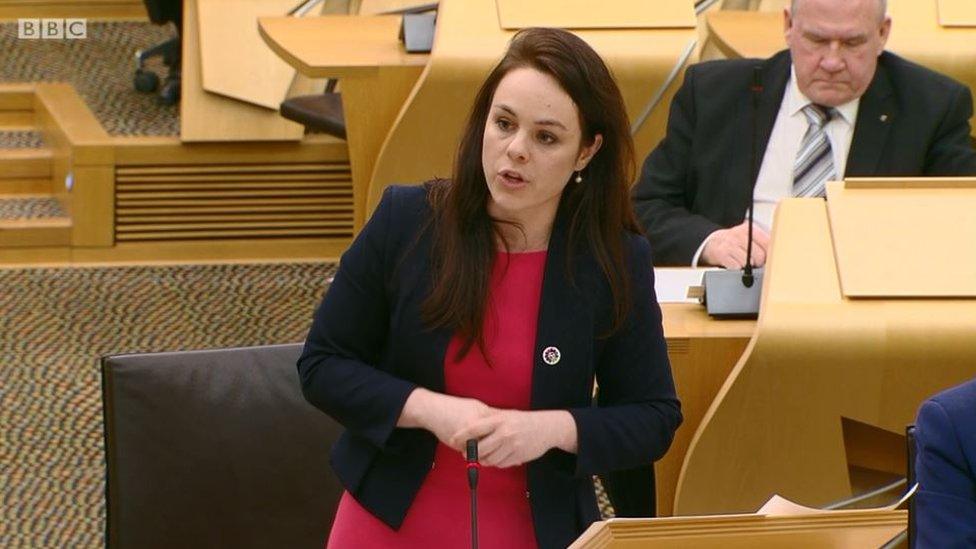Holyrood tax: the devil's in the data
- Published

A feature of newly devolved income tax powers is that forecast revenue and actual tax take has to be reconciled, and that means big adjustments from next year.
Blaming austerity or mismanagement of the economy is some way wide of the mark. This has more to do with dodgy data, and unexpected success in collecting tax.
However, there is a strong case for more sophisticated management of Holyrood's budgets, particularly as some welfare spending is devolved.
A young scientist stunned us recently with the first ever picture of a black hole, somewhere far out in space. It was probably based on very clever science and maths.
But even if it wasn't, who was to contradict her? Who can offer an alternative vision of a black hole?
Black holes fascinate and bamboozle us, because they are mind-bendingly difficult to comprehend. That's why they fit easily into headlines and what passes for political debate.
So when you hear or read there's a £1bn black hole facing the Scottish government, take special care. It's an impossibly big number to comprehend for those more used to a household budget. And no-one else can disprove a mind-bending negative.
The hole in question in recent days consists of changes to the budgets with which Derek Mackay, the finance secretary at Holyrood, has to work from next April.
He says they have opened up because of austerity being imposed from Westminster. His Tory opponent, Murdo Fraser - minding the back of said Westminster government - says they are a measure of the SNP's mismanagement of the economy.
Now, austerity can be blamed for stuff. The SNP may or may not be mismanaging the economy. But it seems neither politician is right about these numbers.
The culprit looks more like dodgy data. And that's the price to be paid when you set up a largely new system of devolved taxation. Let's see if I can explain.
Coffers
Income tax revenue is providing more than £11bn for the Scottish government this year. The figures on which the budget is based were set by the Scottish Fiscal Commission last year, derived from its best guess of what revenue could be expected to roll in.
That guess had to take a stab at how many taxpayers there are in different bands of earning, and how much might slip out of the country to avoid the extra 1% being charged on higher earners in Scotland, when compared with the rest of the UK.
Because tax has not been handled this way before, and because there hasn't been this differential within the UK, quite a lot of it is informed guesswork. And small assumptions can make a big difference when the total adds up to more than £11 billion.

Finance secretary Derek Mackay blames the UK government's austerity policy for the financial "black hole"
Now then: while the Scottish Rate of Income Tax brings spondulicks rolling into Mr Mackay's coffers, the Westminster government is pulling back on the amount it sends up the M1 to Holyrood in the block grant. In a formula agreed by both governments, it withholds the amount that would otherwise be heading north if the tax had not been devolved.
So if the Scottish government rakes in less or more than Westminster's tax choices would have done, through having different tax rates and different growth, then Scottish ministers have to deal with the consequences - either a shortfall on the Westminster baseline, or a surplus.
In addition to the block grant, the Treasury adds funds to pay for devolved powers to handle some aspects of welfare spending. More on that later.
Under-generous
And (here we're getting to the important bit for this week) the Treasury adjusts future funds in the block grant if it finds that past funding has been over- or under-generous. That is a calculation of how much the forecast out-turns for income tax collection varied from the actual out-turn.
This summer, we will get the full and final figure for the amount of Scottish income tax raised in 2017-18. It is expected (yes, it's still a forecast) that it will be £229m less than the Scottish Fiscal Commission forecast it would be.
If that turns out to be right, then the block grant for 2020-21, starting next April, will have £229m less than it would otherwise have done.
In summer of 2020, we'll find out precisely how much was raised in 2018-19. The Scottish Fiscal Commission's current forecast for that (less likely to be accurate now than the one for 2017-18) is £608m.

And the forecast shortfall from the current financial year, 2019-20, will only become clear in summer of 2021, then to mean an adjustment forecast at £188m for 2022-23.
Let's stop a moment and get these numbers in perspective. They add up to just over £1bn. That makes for a good headline. What does it mean? Not much. Public finance is best understood one year at a time.
So let's take the biggest of these one-year numbers: £608m. This year, the Scottish government total budget, including new welfare spending and pensions, comes to around £42bn. So that very large figure of £608m is one pound in 70.
Not much then? Well, look at it another way. It's around half of all the funding for Scottish policing during the current financial year.
Austerity
To return to the "consolidation" figure, or block grant adjustment, does it have to be a shortfall? No. It's very likely that there will always be an adjustment to be made because the forecast is unlikely ever to be bang on target.
But as the Fiscal Commission gets more informed and smarter about the behaviour of the economy and taxation system, the gaps between forecast and actual out-turn should get smaller. And they should be, theoretically, as likely to turn out as surpluses as they are shortfalls.
Why, you might well ask, has this gap opened up so wide, and only become clearer now? The biggest cause of the change is that the Office for Budget Responsibility, forecasting for the whole UK economy and Westminster budgets, reckons that tax revenue has come in ahead of previous expectations.
That kiboshes the argument that this has to do with austerity. But it does raise the question of why a (sort of) windfall to the UK Treasury from income tax payers doesn't seem to be applying to Scottish taxpayers.
One theory I offer is that more assertive tax collection from higher earners - tackling tax avoidance measures such as Employee Benefit Trusts, for instance (remember them?) - is having a disproportionate effect on the part of Britain where most higher earners live.
Stuttering
As if to confuse us, the Scottish Fiscal Commission published this week, in the same document, a sharply reduced forecast for growth of total output from the Scottish economy. For this year, it's down from last December's forecast of 1.2% to only 0.8%, rising to merely 0.9% next year, before it rises slowly above 1% out to 2024-25.
The main reason is given as Brexit uncertainty, including low business investment, productivity gains that are not only weak but weaker than the UK, and cautious consumer spending. The world economy is stuttering a bit as well, as trade wars loom large.
That is now significantly below the growth rate expected for the UK as a whole. But the gap is largely explained by immigration. If you adjust for Gross Domestic Product per person, the rest of the UK - with a faster-growing population - doesn't look like it's growing that much faster.
This forecast is based on an orderly Brexit at the end of October - taking the bold assumption, as the Scottish Fiscal Commission has to do, that government policy is what the government will do. (No, they don't sound too convinced by that either.). Dame Susan Rice, as chairwoman, says a "no deal" Brexit brings with it a "substantial risk to the downside" of these forecasts.

Dame Susan Rice is the chairwoman of the Scottish Fiscal Commission
If, like me, you leapt to the instant assumption that lower growth means lower income tax receipts, you and I would be wrong, at least on this occasion. Lower growth, while we've got very low unemployment, is being accompanied by higher income tax receipts, apparently because real wages have started to rise.
So when an opposition MSP says this "black hole" budget shortfall has to do with SNP policy, he or she is missing most of the picture. It is mainly because of a) a better understanding of how much Scottish income tax has been raising and will raise b) strengthening of UK tax collection and c) it comes despite a modest rise in expected Scottish tax collection.
Get Used To It
If you're still with me (well done), what the Scottish Fiscal Commission is saying to the Scottish government is that volatile revenue is the new normal for Holyrood. And when they say "get used to it", it's not said glibly. They mean: Seriously, Get Used To It. This has to be managed, in a way that Holyrood ministers and their officials, plus scrutinising MSP committees, have not had to do until now.
And while these block grant adjustments, or consolidations, are going to throw (sometimes big, awkward) numbers at the finance secretary every year, the next big fiscal locomotive hurtling up the East Coast Line is welfare spending.
In the current year, that is less than half a billion pounds. Next year, they reckon (another forecast), it will be more like £3.5 billion. A seven-fold increase.
What is different is that much of the benefits budget is demand-led and harder to predict than spending on public services.
That is, you can forecast fairly accurately what it's going to cost to employ police officers and teachers, and how much it will cost to build a given road or hospital. But benefits are claimed by people when they become eligible for them, and if they know how to claim. That eligibility changes as the labour market flexes. And claim rates change when governments and others draw attention entitlements.
Baby grants
The Scottish government - and who could argue with this? - wants to be open about entitlements, and humane in the way people are assessed. But that comes at a cost, and it's one which is illustrated in the latest report by the Scottish Fiscal Commission.

The small changes to devolved welfare spending so far include a new grant for Pregnancy and Baby Care. Eligibility included parents whose children were recently born, so there was catching up to do.
The previous, equivalent grant had 4,000 applications in Scotland in a year. Helped by social media marketing, the newly-designed Scottish grant got 4,000 applications in its first day.
In its first year, the benefit cost 67% more than had been expected. The total was a small sum in the greater scheme of things. But it illustrates the risks of a demand-led system, when ministers want to sound, and to be, relatively generous.
That £3.5bn of extra budget may not meet raised expectations. And if not carefully forecast and managed, responding to the demand could eat into budgets for other spending departments.
A further element of uncertainty in tax revenue is VAT. Holyrood is not getting powers to set and collect it, but to have assigned to its budget the amount that is calculated to be raised in Scotland each year. That should come to more than £6bn.
The formula for calculating the VAT due to Scotland has been agreed between governments. But the data to plug into that formula is far from robust. Experts have been saying for months what Derek Mackay now acknowledges - that there's too much risk attached to the methodology, when small adjustments can have colossal effects, by the hundreds of millions of pounds. It looks like VAT assignment is on hold.
Maturity
To plug looming gaps, the Scottish government has borrowing powers, but these are constrained within the terms of the new devolution arrangements. Even if they were not, they would be constrained by the operations of the bond markets - as the SNP's Sustainable Growth Commission sought to explain to gung-ho enthusiasts for winning independence and going on a borrowing spree.
The current borrowing powers are being deployed, for capital projects. They can't cover the scale of the gap in spending that results from these block grant adjustments, or consolidations.
So tough decisions lie ahead - tax increases, spending cuts, spending postponements, or a firmer push on public sector efficiency through reform.
Is this a special problem for Scotland? It's clearly new, and within the UK's financial set-up, it's got unusual dimensions. But it's more about Scotland joining the world in which governments have to make choices about taxation and to live with the consequences.
At 20 years of age, the Scottish Parliament may not have reached the independence some wish for it, but it is reaching the age of far greater maturity.
- Published12 December 2018

- Published19 February 2019

